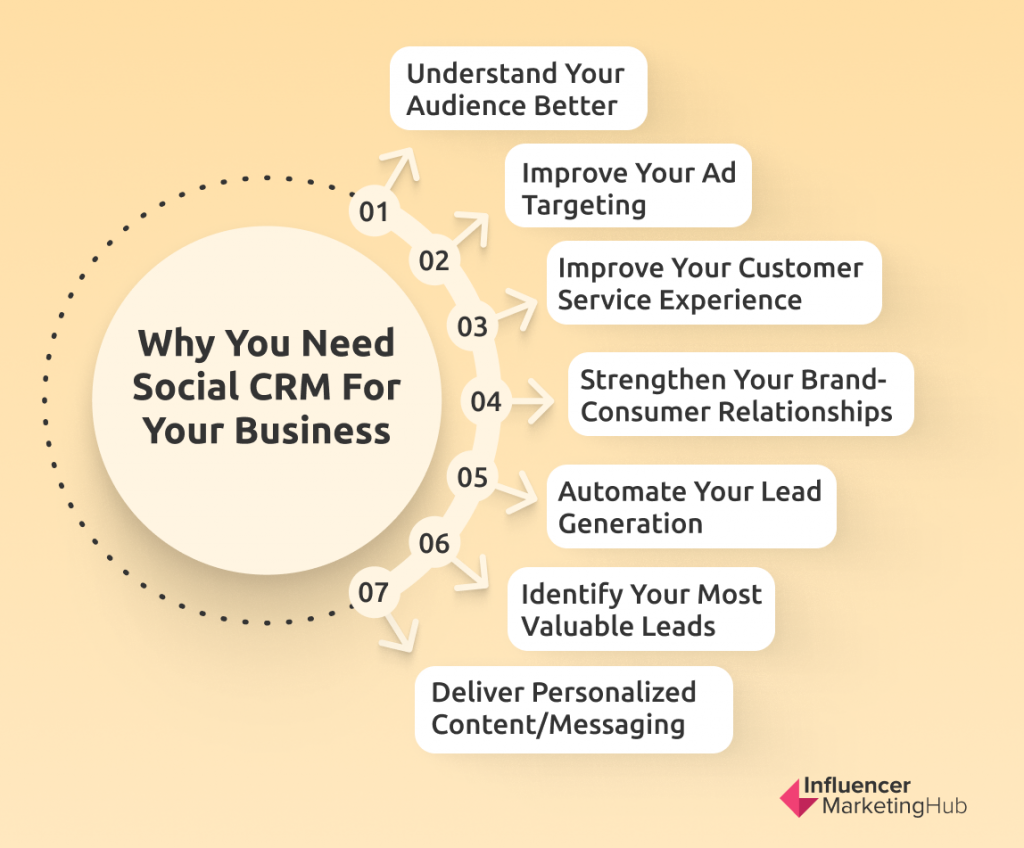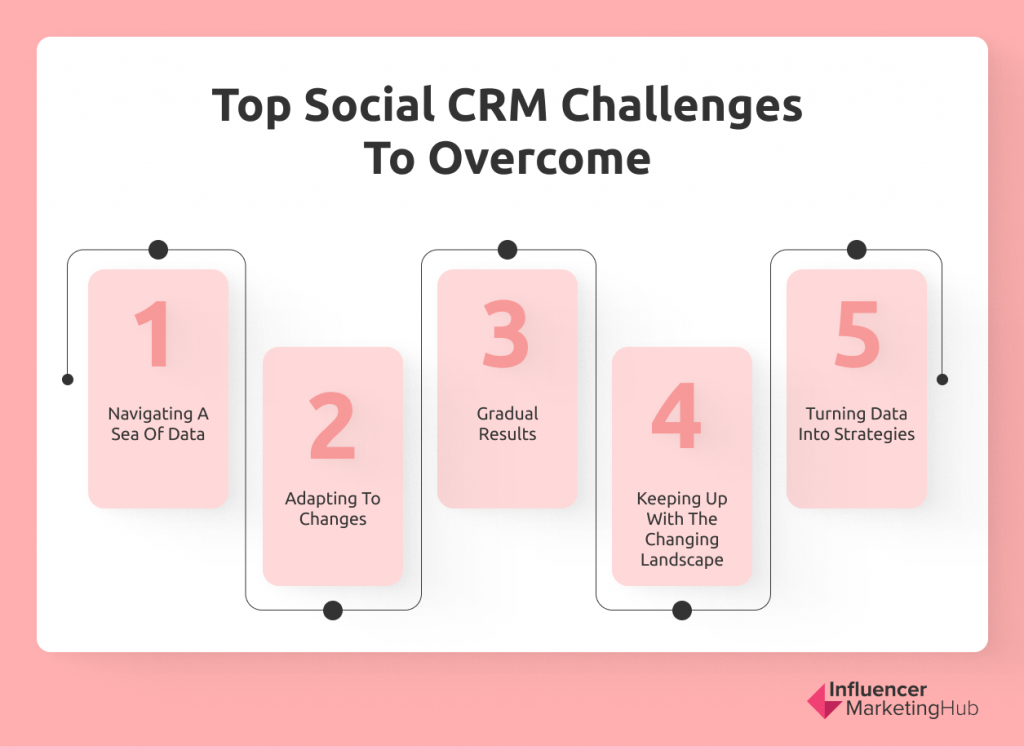Your brand may have a strong social media marketing strategy in place. But if it’s disjointed and used in isolation from other touchpoints, it could leave a bad impression on your audience. In a world where omnichannel customer experiences are becoming an expected standard, you can’t afford to separate your social media from your other touchpoints and departments.
This is why social CRM (customer relationship management) has become vital for businesses that want to streamline and unify the customer experience. In this post, we provide you with an in-depth guide to what social CRM is and how your business can benefit from it in 2022. Let’s get started.
What Is Social CRM and How to Benefit from It:
What Is Social CRM?
Social CRM or social customer relationship management is the process of integrating your social media channels into your CRM system. The idea is to ensure better visibility of customer or prospect information across all departments. That way, teams can see all the previous interactions that the customer or prospect has had with your business including their social media interactions.
The increased visibility into your customers or prospects can empower teams to provide better service, target prospects with timely and impactful ads, or effectively follow up with leads. In other words, social CRM helps to nurture and manage relationships between businesses and consumers.
Why You Need Social CRM for Your Business
By giving you a unified look at your audiences, social CRM can enrich different aspects of your business. From marketing to sales to customer service–different teams can leverage social CRM to improve their efforts and effectively deliver more business value.
Understand Your Audience Better
Social CRM tools come with the ability to monitor what people are saying on social media about your brand, products, or industry. This gives you a better understanding of what your customers want and expect from your brand by revealing their biggest pain points and unmet needs.
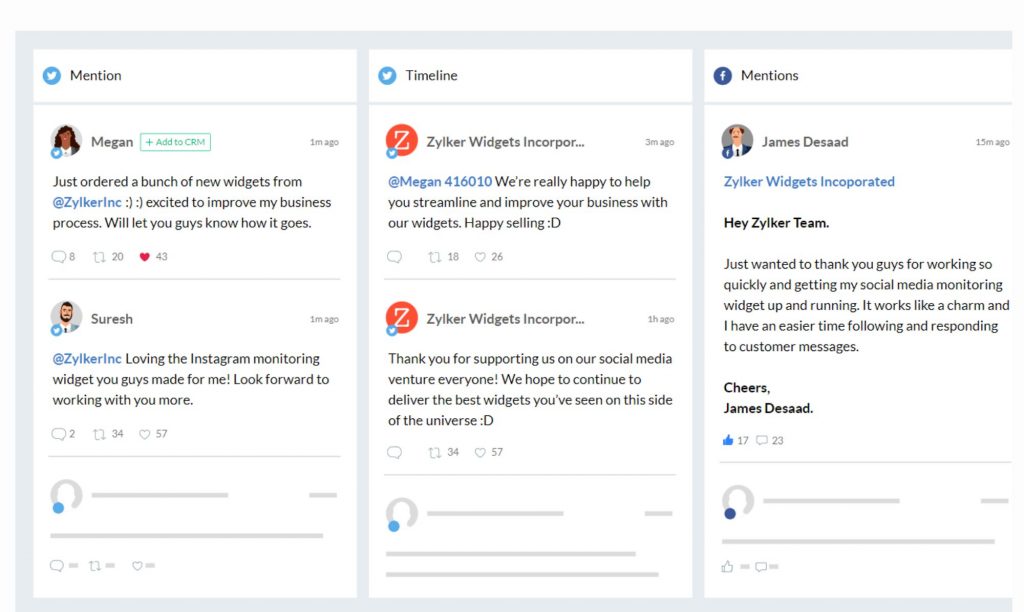
Source: Zoho
A deep understanding of your audience can inform different business processes and help you optimize them. It helps reveal opportunities to craft messages that better resonate with them and address the root source of their biggest frustrations.
Improve Your Ad Targeting
Social CRM can be leveraged to optimize your advertising efforts, especially when it comes to targeting. For starters, you can deliver retargeting ads on social media to prospects who have shown an interest in your products. These ads can be highly personalized based on the pages they’ve viewed and the solutions they need.
Additionally, the information in your CRM tells you who your customers are. This information can then be used for creating highly targeted lookalike audiences that will improve your social ad targeting. That means you can target social media users who share similar social behaviors or other characteristics as your existing customers.
In other words, you’re going to target consumers who are similar to people who’ve bought from you and are, therefore, more likely to also buy from you. For example, if you find that most of your top customers consider themselves “pet parents,” you could create ads that target people who use the title in their social media bio.
Improve Your Customer Service Experience
Social CRM can provide context for every customer interaction so you can know the whole story before crafting a response or offering a possible solution. That way, team members can easily pick up conversations where other departments left off, providing a unified and streamlined customer experience.
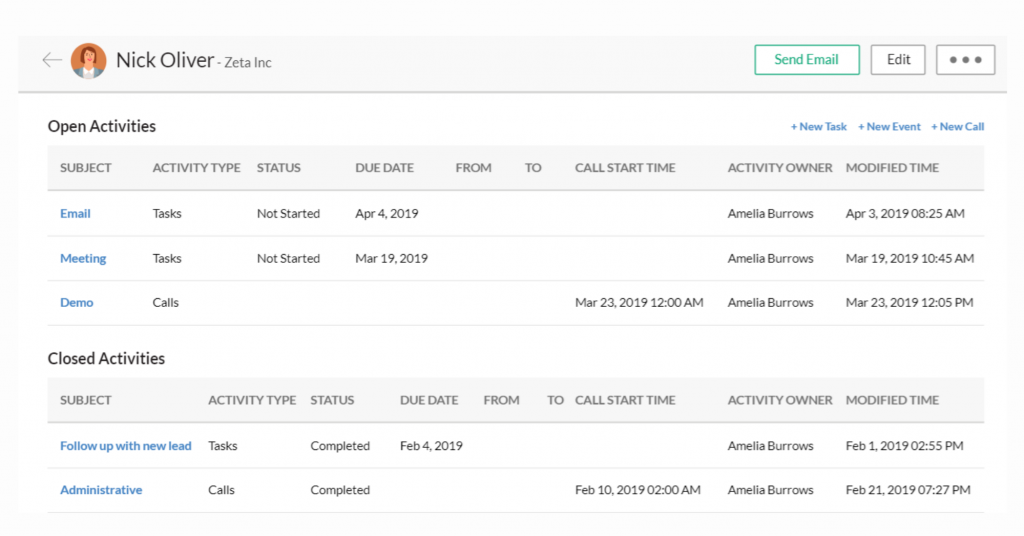
Source: Zoho
In other words, customers or prospects won’t have to keep repeating the same information over and over again as they interact with different departments. Sales can easily continue nurturing a prospect that was sent over from marketing. Similarly, customer support teams won’t have to keep asking the customer to repeat the issue because they can simply refer to their conversation history to understand why a customer is frustrated.
Having a clear understanding of the situation and how it’s been dealt with in the past will equip you with the information you need to provide a viable solution. This minimizes the back and forth that could cause additional frustration for an already upset customer and result in a nasty situation like in the example below.
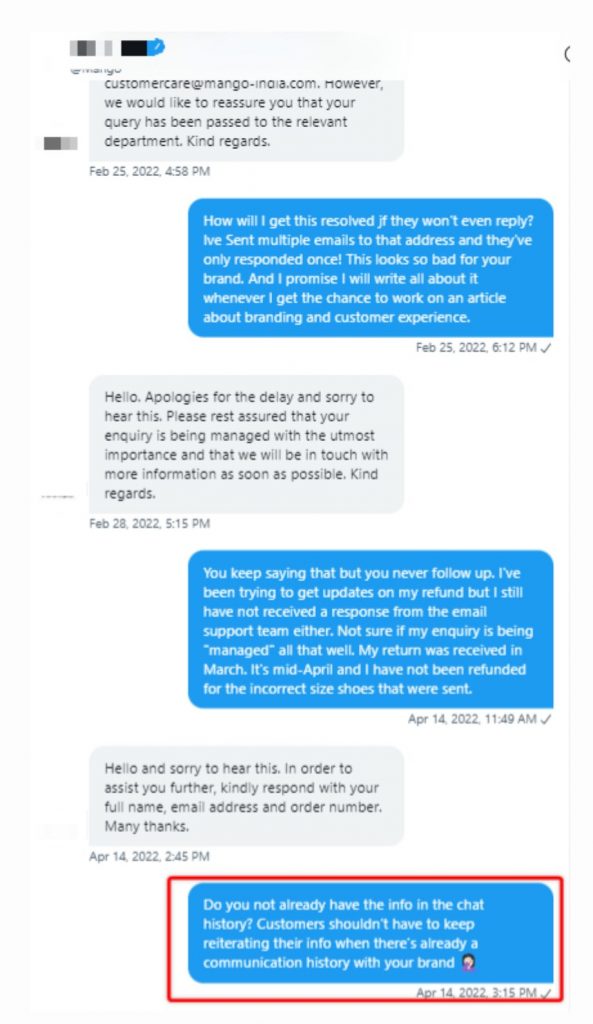
Source: Twitter
Moreover, social CRM allows you to proactively provide your customers with the help they need. If you have ready access to their order information, it can add context to their queries or support requests and enables you to offer an immediate and relevant solution.
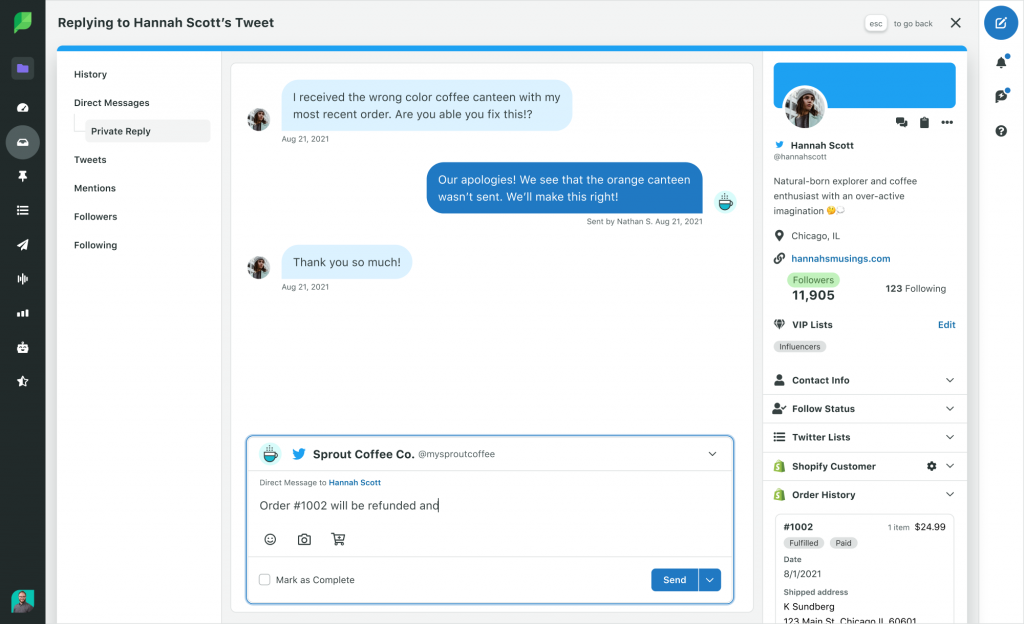
Source: SproutSocial
Strengthen Your Brand-Consumer Relationships
The context that you gain through social CRM is essential for holding meaningful conversations. It shows consumers that you’re really listening to them, which helps to humanize your brand and strengthen your relationship with them. So you’re not just jumping in on conversations out of the blue or responding to customers with copy-pasted messages that aren’t even relevant to their concerns.
Let’s say a prospect dropped out of the pipeline because their business had been experiencing some financial issues. When your team follows up to reactivate them months later, referencing their past problems and asking how they’re doing now will help you establish a bond with them.
Consumers want to keep coming back to a brand that understands them and listens to them. Social CRM empowers you with the information and visibility needed to deliver the kind of experience that will strengthen your relationship with prospects and customers alike.
Additionally, social CRM helps you with timely follow-ups–whether it involves sending an email about an issue raised on social media or making a call to onboard new customers. You can use social CRM tools to assign relevant team members to follow up and ensure that there’s visibility of these assignments across teams.
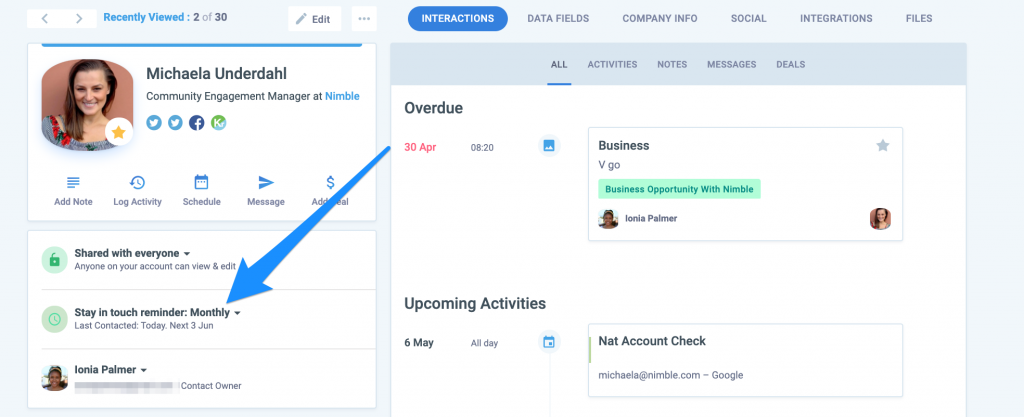
Source: Nimble
Automate Your Lead Generation
With the right social CRM tool, you could easily turn your social media interactions into high-value leads. You can automate the lead generation process by establishing automation workflows that will be triggered by some type of interaction with your brand’s social media.
For example, if someone mentions your brand, replies to your post, or shares your post, you could automatically add them as leads and have your sales team follow up with those accounts. Or if you get a direct message from someone, you could automatically add them as a contact. This automated lead generation process saves you heaps of time and helps you build a strong contact list that could prove to be valuable for your brand.
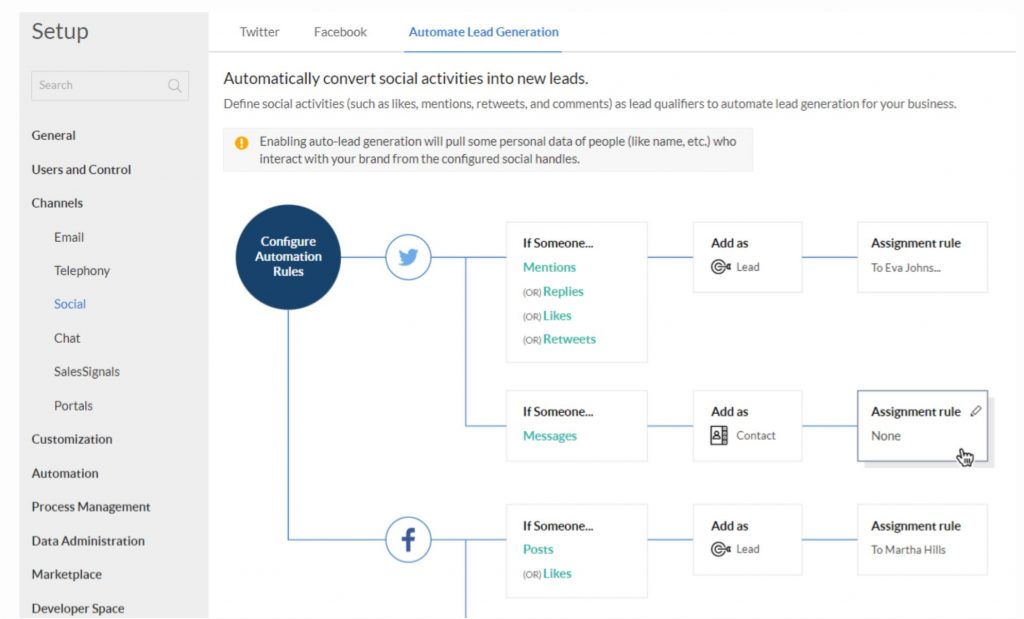
Source: Zoho
Identify Your Most Valuable Leads
Many social CRM tools come with the capability to automatically score your leads by incorporating social profiles and interactions into your prospect data. You can identify your most valuable leads based on useful information on their social profiles such as their company name and title, how they’ve interacted with your ads in the past, or even how much revenue their company has.
This allows you to save time by streamlining your outreach efforts and following up with contacts that are most likely to close. For instance, you could identify prospects with a C-suite title in their social profile and have clicked on your social media ad in the past week.
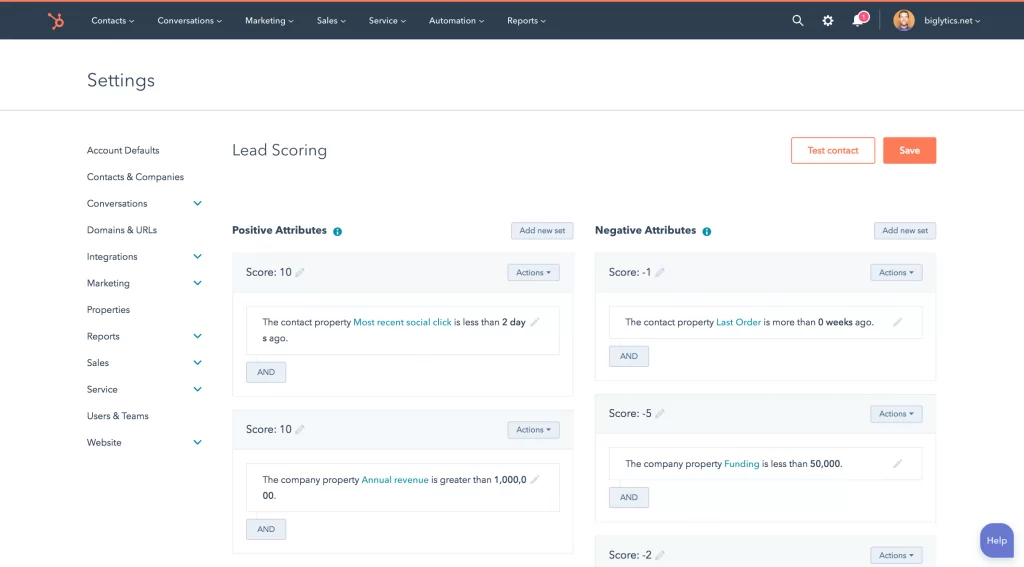
Source: HubSpot
Deliver Personalized Content/Messaging
With an abundance of generic messaging and marketing content out there, it’s easy to add to the noise and risk getting overlooked by valuable prospects. In many cases, your message may not resonate or your content may not be what the prospect needs.
By giving you access to information on social profiles and interaction history, social CRM allows you to craft relevant and engaging content or messaging personalized for your prospects. This can be highly effective for crafting a personalized outreach strategy for all your contacts and improve their chances of converting.
For example, a whitepaper may work well enough for hooking in prospects that are still at the awareness stage. However, those at the consideration stage may be more easily swayed by a thorough presentation where a sales rep takes them through the entire process of signing up and installing the software.
Top Social CRM Challenges to Overcome
Although social CRM offers a wealth of benefits, the process of setting it up comes with a few hoops and hurdles. It’s important to be aware of these challenges so you’re prepared to overcome them.
Navigating a Sea of Data
Social media generates vast amounts of data, which may be difficult to navigate. This is especially challenging for larger brands since they have to deal with larger conversation volumes around their brand or products. It’s easy to get overwhelmed by the sheer volume of information that you have to sieve through.
As a result, you may have a hard time narrowing down the data that would be actually useful for you. That means your team could be wasting their time and resources trying to analyze data that doesn’t have much value for your business.
Adapting to Changes
Another major challenge is that social CRM will undoubtedly affect change within your organization. In fact, it may result in a major upheaval in the way your customer support, sales, and marketing teams function. And it’s not easy learning how to use new tools or adapting to new processes that are different from how you’ve always done things.
This makes it crucial to ensure that every team member is thoroughly educated about the benefits of adopting social CRM. For example, automated lead generation and simplified lead scoring can help your sales teams improve their productivity while closing more sales. Knowing how social CRM benefits them directly can give them the motivation to embrace whatever changes it brings.
Gradual Results
The value of social CRM isn’t something you can see overnight. The process of collecting data, sorting it, and extracting valuable insights from it can be time-consuming. Moreover, many businesses may be unable to collect enough data at the start, especially if they have a smaller audience base. As such, many businesses may not see the immediate benefit of social CRM.
It’s important to persist and be consistent with your efforts as the quality of data improves over time. This will eventually allow you to extract value out of social data.
Keeping Up with the Changing Landscape
As you may already be aware, the social media landscape is changing constantly with new trends taking shape and new platforms emerging. So it can be challenging to keep up with all these new platforms and trends and stay up to date with the shifting landscape.
For example, if a majority of your customers are starting to be more active on a new platform, you’ll need to look for ways to integrate the platform into your CRM. Or if people are starting to create more short-form videos than text content, you’ll need a platform that is capable of collecting the metadata from videos.
Turning Data into Strategies
The overwhelming amount of data also makes it challenging to organize the information and analyze it to uncover valuable insights. It’s easy to get lost and miss the important details that you can leverage for your business. As a result, you may be unable to effectively take the data and implement it into strategies that can yield a business value.
This makes it crucial to work with experienced human analysts who will be able to spot trends and connect the dots so you can get actionable insights. These insights can then be incorporated into strategies that will bring a positive business outcome.
Setting Up a Social CRM Process: How to Get Started
Now that you know exactly what benefits you can expect and what challenges you’d have to overcome, it’s time to get started with social CRM. Having a proper social CRM process set up is important so you can organize your efforts and make a seamless transition.
1. Invest in the Right Social CRM Platform
The success of your social CRM strategy relies heavily on the platform you use. You need something that can seamlessly integrate with your existing CRM system while being able to pull data from all the social networks you’re using. Moreover, it should come with all the capabilities you need such as a consolidated inbox where you have one place to manage all the messages, comments, and notifications from multiple channels.
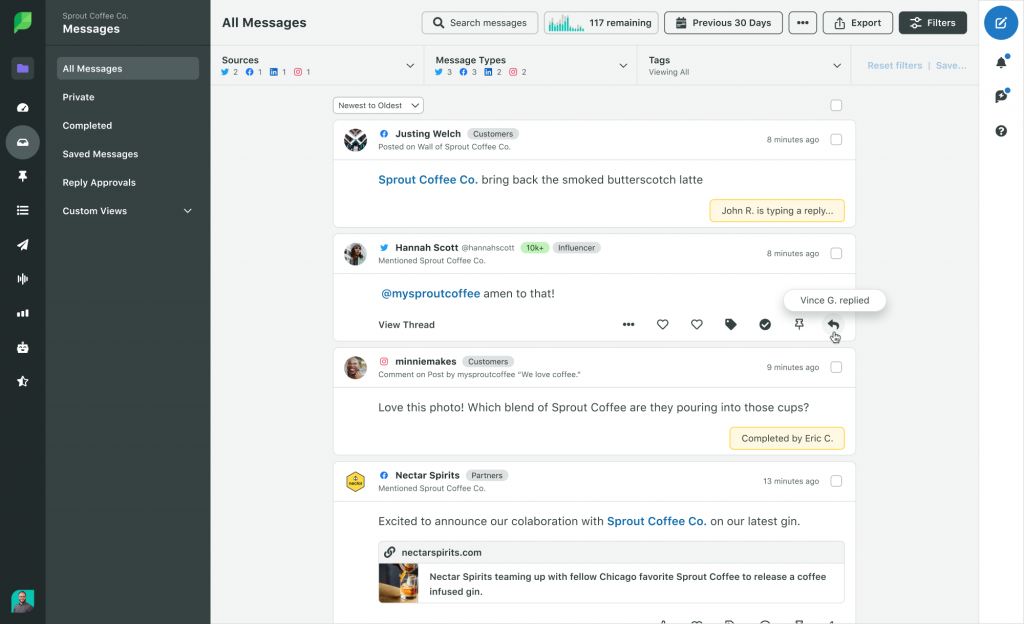
Source: SproutSocial
Additionally, you should also consider additional features that might come in handy. Social listening capabilities are good to have since they allow you to monitor conversations beyond brand mentions. This helps you get a better understanding of your audience so you can develop more effective strategies.
Consider trying HubSpot’s social CRM to streamline your social interactions, prioritize engagement, and manage all your content and campaigns from one convenient platform. Get started for free!
2. Decide on Your Key Social Networks
Next, you’ll have to think of which social networks you want to focus on. This largely depends on where you want to build your social presence. Although you might want to manage every leading social network possible, it’s best if you start with the ones that are most relevant to your business. Which platforms are your audience using and where are your customers trying to interact with your brand?
For example, some B2B companies may be more likely to get leads through Twitter and LinkedIn. So focusing their efforts and resources on effectively using those two networks is better than trying to fit in platforms like Instagram.
3. Develop a Response Protocol
An important step is determining what action should be taken in different scenarios. How should you react to each customer interaction? When do you respond to comments and when do you add a follower as a lead? Make sure you have a protocol in place that clearly defines what each team needs to do for every situation.
Moreover, in situations where you’re responding to a comment, post, or message, you should also clearly specify how to respond. For example, you may want to take a public conversation private by asking the customer to DM you. Or you may ask them to send you their email address so your support team can follow up through the appropriate channel.
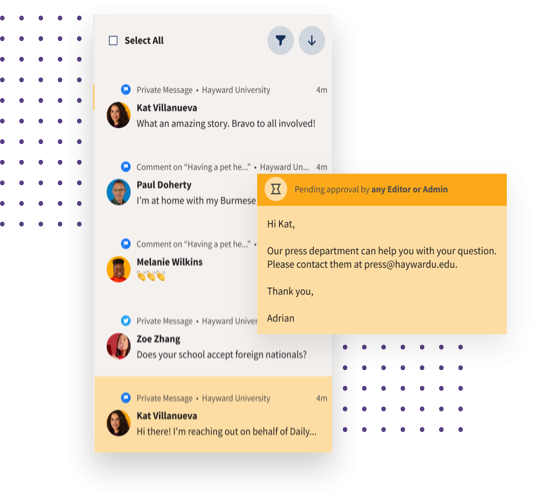
Source: Hootsuite
This will bring clarity and consistency to your social CRM process. It also sets the stage for better collaboration between different teams since everyone knows what they need to do and when they need to pass a lead or prospect on to another team. You can even use this protocol to build automation workflows for lead generation, marketing, sales, and customer support.
4. Use Social Listening to Your Advantage
Social listening is crucial to enriching the data in your social CRM and gaining a better understanding. Make sure you’re monitoring conversations that mention your brand or your products/services. Additionally, you should be on the lookout for conversations around specific keywords that are relevant to your business.
This will help you to identify potential leads and follow up promptly or spot emerging issues and fix them before they escalate. The insights from your social listening efforts can then enrich your data and provide different teams with the support they need to deliver better results.
One way to gain access to these crucial insights is to use specialized solutions, like HubSpot. This isn't just hearsay, as HubSpot has more than 228,000 happy customers. So why not try it and see how it can transform your social media game..
Growing with Social CRM
Whether in terms of customer service or sales, there are many ways that your business can benefit from using social CRM. Make the most of the tips and ideas given above to incorporate social CRM into your business.
Frequently Asked Questions
What is a social CRM strategy?
A social CRM strategy involves enriching your customer relationship management with social data where your social media channels are integrated into your CRM system.
How do you create a social CRM strategy?
You can create a social CRM strategy by using the right social CRM tools, choosing the key social networks to focus on, and developing a response protocol to follow.
What are the benefits of social CRM?
Social CRM can improve your customer support process while helping you generate quality leads and improve your lead scoring system using social data.
How does social media affect CRM?
Social media provides an easy channel for customers to reach out to businesses. These interactions can be used for enriching your CRM and improving your customer support processes.
What is social CRM and its importance?
Social CRM is the process of integrating social media into your CRM. It helps you create a unified customer experience, which is essential for generating leads and improving your support.
